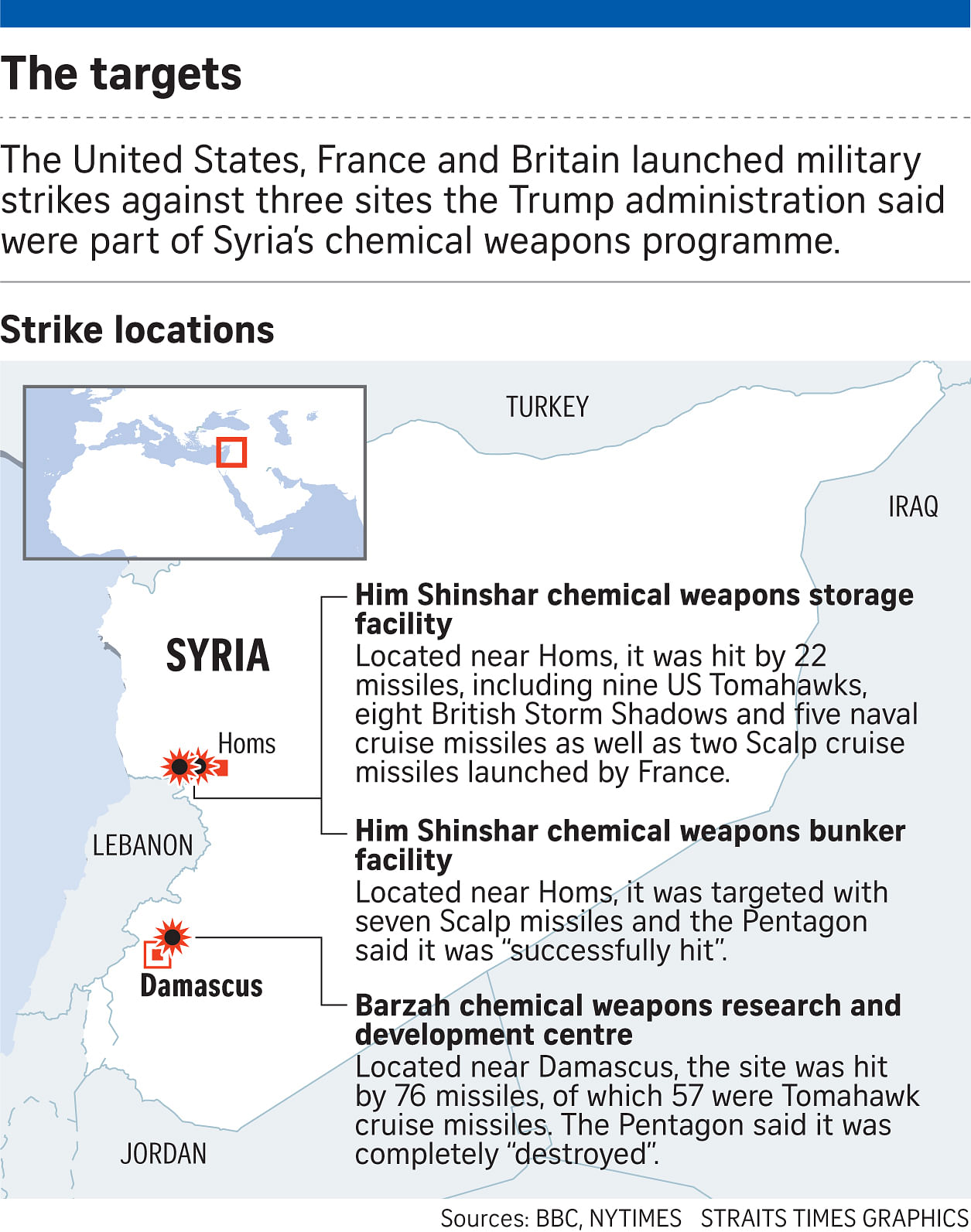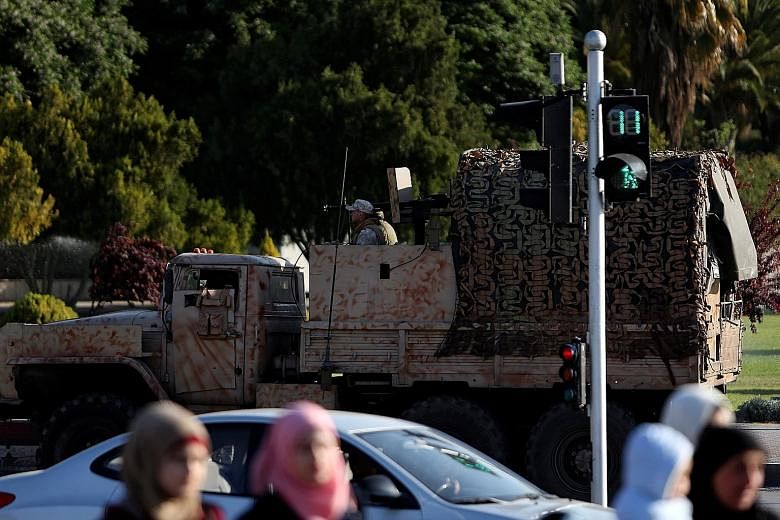BEIRUT • As it became clear that the limited US-led attack posed no threat to President Bashar al-Assad's hold on power and would likely have no impact on the trajectory of the Syrian war, it prompted defiant celebrations in Damascus.
Fears of a wider escalation faded after it emerged that the locations targeted by the US, Britain and France had been confined to three sites associated with the Syrian chemical weapons programme, had caused no serious casualties and had probably not destroyed Syria's capacity to develop and deploy banned chemical substances.
There were expressions of anger from Syria's allies, with Russia labelling the attack an "act of aggression", Iran calling it "a war crime" and Syria describing it as "barbarous".
But on the streets of Damascus, there was jubilation. Residents gathered in central squares and danced to patriotic songs, waving Syrian flags alongside those of Russia and Iran, Syria's allies in the fight against the anti-Assad rebellion.
"The honourable cannot be humiliated," read a tweet by the Twitter account maintained by Mr Assad's office shortly after the attack.

-
One-time action but...
-
The United States, Britain and France on Saturday launched strikes on Syria a week after US President Donald Trump warned of a "big price" to pay for the apparent use of chemical weapons by President Bashar al-Assad's forces in the town of Douma, in an attack that killed scores of civilians. Here are some possible next steps following the strikes.
ARE THE ATTACKS OVER?
British Foreign Secretary Boris Johnson said yesterday that Western powers would study "options" if Syria's government again used chemical weapons, although nothing was planned as yet.
US Defence Secretary James Mattis said that "right now, this is a one-time shot and I believe it has sent a very strong message to dissuade him, to deter him."
While US President Donald Trump has called the operation a success, he has also warned in his televised address of a readiness to "sustain this response until the Syrian regime stops its use of prohibited chemical agents". He did not specify what that meant.
Meanwhile, US Ambassador to the United Nations Nikki Haley said the US is "locked and loaded", and ready to punish Syria again if it keeps using chemical weapons.
WHAT'S NEXT?
British Prime Minister Theresa May is expected to address Parliament this week amid a backlash from the opposition for launching the strikes without consulting Parliament. Opposition leader Jeremy Corbyn has accused Mrs May of "waiting for instructions from President Donald Trump".
French President Emmanuel Macron said on Friday that the French Parliament will hold a debate on the intervention. Under the French Constitution, Parliament must be informed within three days of all major military operations, but only gets a binding vote if they last more than four months. Mr Macron's advisers said on Saturday that the strikes took place in a legal framework.
BLOOMBERG, REUTERS
A few hours later, the account tweeted a video of him walking nonchalantly to work through the halls of the Syrian presidential palace.
Though the strikes appeared to have satisfied the conflicting agendas of the world powers competing for influence in Syria, they will not make any difference to the war on the ground - which Mr Assad is steadily winning, said Associate Professor Amr al-Azm, who studies Middle East history at Shawnee University in Ohio.
"This was more about the Western allies making sure their red lines were addressed rather than trying to seriously damage the Assad regime, prevent the further killing of civilians or reduce the capacity of the Assad regime to keep fighting," he said. "From Assad's perspective, this was a big win. He must be thinking, this is good, I came out on top, I gained much more than I lost."
It was unclear even whether there would be a long-term impact on Syria's capacity to develop and use chemical weapons.
President Donald Trump had telegraphed for days the likely response of the US to the alleged chemical attack that killed civilians in a rebel stronghold on April 7, giving the Syrian authorities and their Iranian and Russian allies time to vacate the facilities that were targeted - and perhaps also to remove vital equipment and stores.
Russia said that the damage had been minimal, and that most of the more than 100 missiles fired were intercepted.
According to the Syrian army command, three civilians were injured, in the vicinity of one of the strikes against Homs.
"It remains to be seen whether the allied attack fulfilled all its intended goals," said Mr Karl Dewey of Jane's by IHS Markit defence consultancy.
This was the second strike against Syria in a little over a year, in response to the second alleged use by the government of a poison gas against its citizens.
In April last year, the United States bombed Shayrat Airbase in the province of Homs in retaliation for a sarin gas attack that killed around 70 people in the northern town of Khan Sheikhoun.
These latest strikes went further than last year's attack, targeting production and research facilities as well as command centres from which attacks are launched.
The Pentagon said that the locations hit were a scientific research centre in the Barzeh suburb of Damascus, a chemical weapons storage facility west of Homs, and a chemical weapons equipment storage facility and a command post, also near Homs.
But although US Defence Department spokesman Dana White said the strikes had "set the Syrian chemical weapons programme back for years", Pentagon officials acknowledged that a "residual" capacity remained.
Seeking to tamp down the global tensions that soared after Mr Trump tweeted last week that missiles are "coming, nice and new and smart", the US and its allies stressed the limited nature of their goals.
"This was not about interfering in a civil war, and it was not about regime change," British Prime Minister Theresa May said at a news conference in London.
Ms White echoed the comment, saying that the attack "does not represent a change in US policy, nor an attempt to depose the Syrian regime".
The US and its allies said they hoped the attack would propel momentum towards the revival of peace talks in Geneva that have so far proved fruitless.
But there was no reason to believe these strikes would give any new incentive to Mr Assad to cooperate with a peace process that Washington says should result in his removal from power, said Mr Emile Hokayem from the International Institute for Strategic Studies.
"Assad has absorbed worse before, and he will absorb this," he said.
WASHINGTON POST
SEE OPINION

